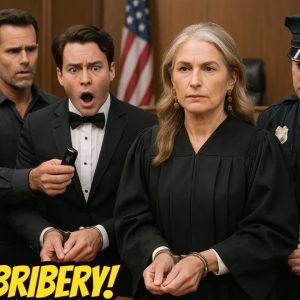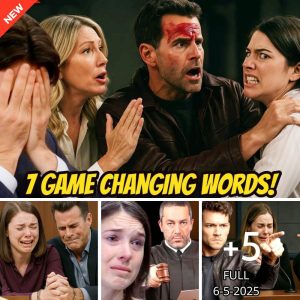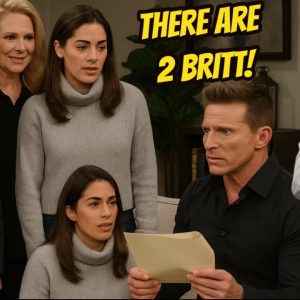In the storied and shadowy corridors of Port Charles, drama often unfolds at breakneck speed.
But this time, the most explosive story didn’t take place in front of the camera—it erupted behind it.
The sudden departure of Emmy Award-winning actor Jonathan Jackson, long regarded as the beating
heart of General Hospital in his role as Lucky Spencer, sent tremors through the soap opera world. While fans were left reeling, puzzled by his abrupt exit announcement on social media, whispers from behind the scenes have begun to paint a clearer—and far more dramatic—picture of what really happened.
A Legacy Dimmed
For decades, Jonathan Jackson’s Lucky Spencer served as a moral anchor in a world of shifting loyalties, mob intrigue, and romantic upheaval. His return to the show in recent years was celebrated as a homecoming. But insiders suggest that his reentry into the GH universe wasn’t the triumphant return it appeared to be.
“Jonathan was promised compelling material,” one source close to the production revealed. “But instead, he found himself sidelined—his character showing up for minor scenes, offering moral support to others, and slowly fading into the background.”
The star, known for his dedication to craft and beloved for his earnest portrayal of Luke and Laura’s son, reportedly began voicing frustrations privately. His scenes were few and far between, lacking the narrative gravity that once made him a linchpin of the series.
Then came Rory Gibson.
A New Face in the Spotlight
Rory Gibson’s arrival on General Hospital as the recast Michael Corinthos was accompanied by a promotional blitz usually reserved for daytime royalty. Behind-the-scenes specials, high-gloss teasers, and a social media rollout heralded the reimagining of the Corinthos heir as a central figure in the show’s future. For Jackson, it was a bitter pill.
While Jackson’s Lucky was reduced to providing quiet guidance in break-room scenes and walk-on appearances at Kelly’s Diner, Gibson’s Michael was thrust into the white-hot center of every major plot. Explosive mob storylines, a controversial custody battle with Carly, an undercover mission with life-or-death stakes—the Corinthos narrative was roaring forward, while the Spencer legacy seemed to stall.
“It didn’t go unnoticed,” another insider shared. “Jonathan had built so much of GH’s emotional foundation. Watching someone else get the screen time and arcs he was once known for… it was painful.”
Rising Tensions
As the two actors began to share more scenes—hospital encounters, stakeouts, and late-night family summits—the cracks beneath the surface widened. Initially, there were efforts at camaraderie. Gibson, respectful of the legacy Jackson represented, attempted to build rapport. But Jackson, known for his professionalism, reportedly became withdrawn and curt.
“It wasn’t like Jonathan to be cold,” a longtime crew member said. “But something had shifted. He barely said hello some mornings. He kept things clipped. We all felt the tension.”
Gibson, caught between admiration and frustration, did his best to stay above the fray. But the resentment simmered. And eventually, it boiled over.
The Brawl That Shook the Set
The flashpoint came during a grueling two-day exterior shoot on the docks—an episode pivotal to the unfolding mob arc. The storyline had Lucky and Michael teaming up to retrieve evidence from a cartel informant. The scenes were dense with emotion and distrust, with the actors required to convey layered intensity under sweltering heat and exhausting hours.
On day one, things went smoothly. The director praised their chemistry. But what followed off-camera was anything but harmonious.
In the relative privacy of the makeup trailer, Jackson reportedly confronted Gibson in a heated exchange. Sources claim he accused Gibson of “stealing the spotlight” and suggested that the creative team had orchestrated his marginalization in favor of the younger actor.
Gibson, stunned, defended himself. Witnesses say he implored Jackson to take the matter up with producers and avoid internal conflict. “This isn’t helping anyone,” he reportedly said. “I’m not your enemy.”
But the damage had been done.
The next day, the same scene lost its spark. The previously taut energy between the two men now felt stiff, rehearsed, and strained. Behind the set walls, voices rose in argument once again. This time, crew members overheard Jackson shouting about years of neglect and Gibson clenching his fists, insisting he never asked for Lucky’s legacy.
A production assistant was dispatched to break the moment before it escalated into physical confrontation. The director called an emergency halt, fearing a complete derailment. To salvage the shoot, Gibson was discreetly moved to a nearby cafe to finish coverage, while a stand-in was used to complete Jackson’s scenes.
When the episode aired weeks later, eagle-eyed fans noticed abrupt cuts and awkward transitions—small but telling signs that something had gone wrong.
Spin Control
The network scrambled to manage the fallout. A flurry of statements praising both actors’ professionalism was released. Industry reporters received carefully worded denials of any on-set discord. And privately, executive producers reached out to Jackson in hopes of keeping him aboard.
Behind closed doors, creative teams reportedly pitched a compelling new arc to woo Jackson back—an assassination attempt, a return of a lost love, even a secret prison stint that would re-establish Lucky as a tortured hero on a redemptive path.
Though tempted, Jackson ultimately declined to extend his stay beyond a handful of farewell episodes.
“Jonathan loves the character. He grew up with Lucky. But he also knows when a chapter is over,” a close confidante said.
Legacy in the Balance
The implications of Jackson’s departure go far beyond one character. Fans, who have long seen the Spencer lineage as GH’s emotional backbone, now wonder whether the series is shifting permanently toward the Corinthos dynasty.
Some have applauded Gibson’s portrayal of Michael and the show’s bold, high-stakes storytelling. Others worry that sidelining legacy characters risks alienating long-term viewers.
What’s certain is that the incident has opened a fissure—one that the show’s producers must now mend with care. The magic of General Hospital has always stemmed from its delicate balancing act between the old and the new, the beloved and the rising stars.
As for Jackson, he exits with his head held high, leaving behind a character that reshaped daytime drama and a legacy not easily eclipsed.
In Port Charles, stories are reborn every day. But off-camera, scars often take longer to heal.





